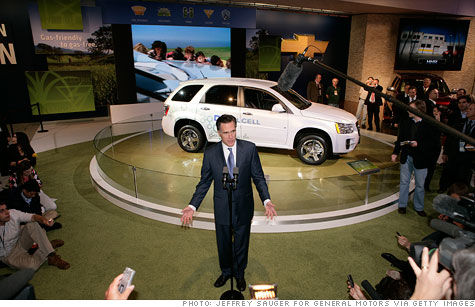Search News

Pre-bailout: Romney with a Chevy in 2008.
NEW YORK (CNNMoney) -- Should the U.S. government sell its shares in GM?
Mitt Romney says yes. And he wants President Obama to do it now.
"The Obama administration needs to act now to divest itself of its ownership position in GM," the presidential hopeful writes in the Detroit News. "The shares need to be sold in a responsible fashion and the proceeds turned over to the nation's taxpayers."
Here's the thing: Taxpayers are already in line to get the proceeds from any government sale of GM (GM, Fortune 500) shares. In fact, the Obama administration has long planned such a move.
The only issue is timing.
If the government moved now to dump the 500 million GM shares that it still owns, as Romney suggests, taxpayers would be guaranteed to take a loss.
GM shares currently sit at $25.40, far below the $51 per share price necessary for taxpayers to break even. Selling the shares would recoup about $12.7 billion, but leave taxpayers with only about half of the $25.5 billion they have yet to get back from the $49.5 billion bailout of GM in 2009.
If the government waits, and GM shares increase in value, more of the government's investment would be recouped.
On the flip side, if GM shares were to slide, taxpayers would be left with a bigger loss on the money Treasury spent to help see the automaker through its 2009 bankruptcy reorganization.
Analysts think GM stock will rise.
GM shares are predicted to hit $32 within a year, according to analysts surveyed by Thomson Reuters.
If Treasury were to sell all its shares now, and GM shares do rise within a year to the $32 level predicted by analysts, taxpayers would be out $3.3 billion, a not-insignificant amount.
A Romney campaign spokesperson told CNNMoney that Romney is not advocating a "fire sale," and that a sale should be carried out in a "responsible fashion."
"The over-arching point here is that the government has no business owning stakes in private enterprises," the spokesperson said in a statement.
By holding out for a better share price, Treasury is taking a politically fraught path that leaves the Obama administration open to criticism.
At the time of the automaker's 2010 IPO, many people expected Treasury would try to sell its remaining stake by the end of 2011, if for no other reason than to close the books on the deal before the president's re-election effort got underway.
But Steven Rattner, who left the Obama administration shortly after overseeing the GM bailout and bankruptcy, told CNNMoney in November that Obama's reelection was never an issue in the government's exit strategy.
"I think there are much bigger issues for the campaign than when the government does or doesn't sell its GM stake," he said. "The most important thing is to sell it at the right time, not too soon and not too far away."
And Rattner said given the drop in GM's share price, this is not the time to sell shares.
"I don't myself, at the moment, see any particular reason why the U.S. should rush to sell at a much lower price when the company is doing very well," Rattner said.
GM CEO Dan Akerson told the Economic Club of Detroit last year that it doesn't matter to the company when Treasury sells.
"It doesn't change how we run the business," he said. "We're content to let Treasury move at its own pace."
Romney's suggestion that the Obama administration divest immediately came within the context of a larger argument: Detroit would have been better off without government help.
"The president tells us that without his intervention things in Detroit would be worse," Romney said. "I believe that without his intervention things there would be better."
At the time of the bailout, Romney wrote an op-ed in the New York Times that asserted a bailout would result in the end of the American auto industry.
"If General Motors, Ford and Chrysler get the bailout that their chief executives asked for yesterday, you can kiss the American automotive industry goodbye," Romney wrote in November 2008. "It won't go overnight, but its demise will be virtually guaranteed."
Romney is now trying to thread the needle between that prediction and another point he made in the same op-ed: That a managed bankruptcy was the only way for the industry to survive.
The Obama administration did eventually force GM and Chrysler into bankruptcy protection, but the bailout provided financing that allowed both to stay in business and reorganize. Each are now profitable again and hiring.
Most auto industry experts believe that one or both companies could have been forced to go out of business and liquidate without the government financing during bankruptcy, given the difficulty of arranging financing at that time. The Center for Automotive Research, a Michigan think tank, estimates that the bailout saved 1.5 million jobs.
| Overnight Avg Rate | Latest | Change | Last Week |
|---|---|---|---|
| 30 yr fixed | 3.80% | 3.88% | |
| 15 yr fixed | 3.20% | 3.23% | |
| 5/1 ARM | 3.84% | 3.88% | |
| 30 yr refi | 3.82% | 3.93% | |
| 15 yr refi | 3.20% | 3.23% |
Today's featured rates:
| Latest Report | Next Update |
|---|---|
| Home prices | Aug 28 |
| Consumer confidence | Aug 28 |
| GDP | Aug 29 |
| Manufacturing (ISM) | Sept 4 |
| Jobs | Sept 7 |
| Inflation (CPI) | Sept 14 |
| Retail sales | Sept 14 |